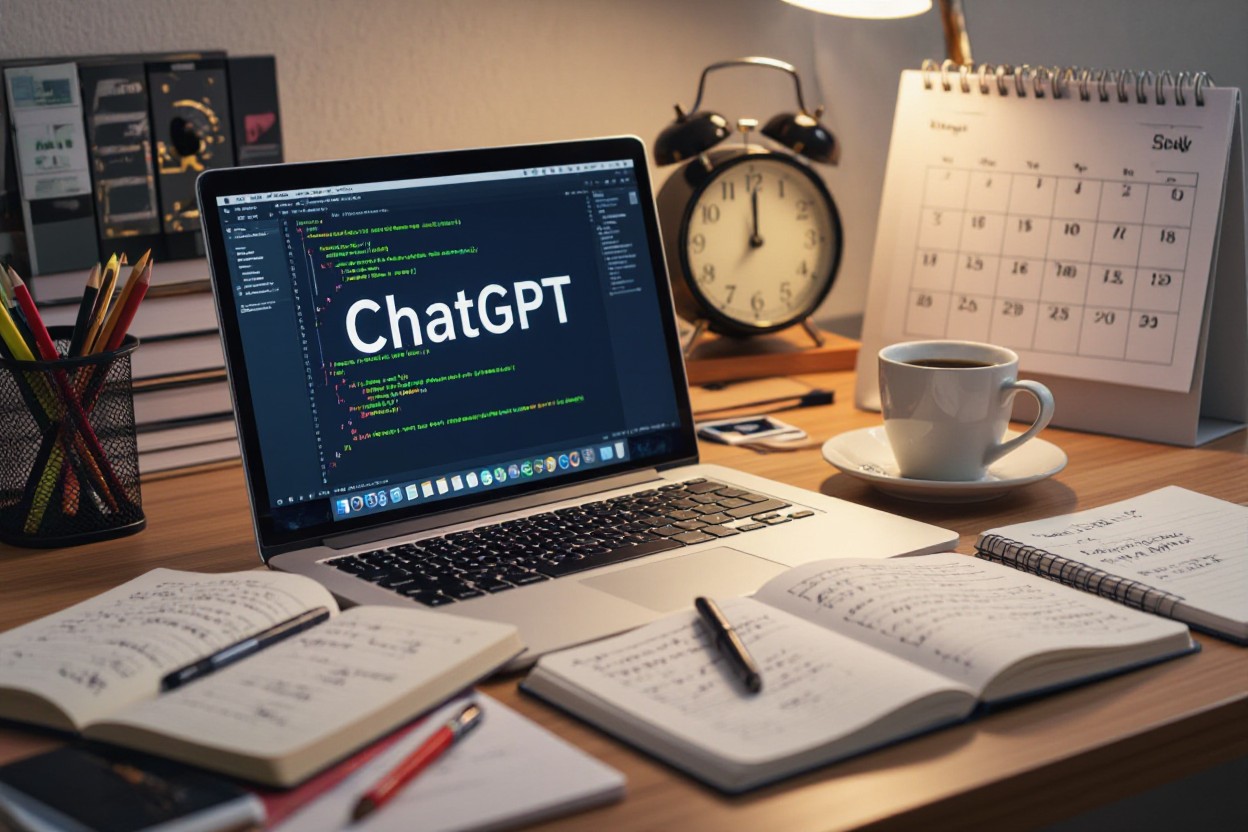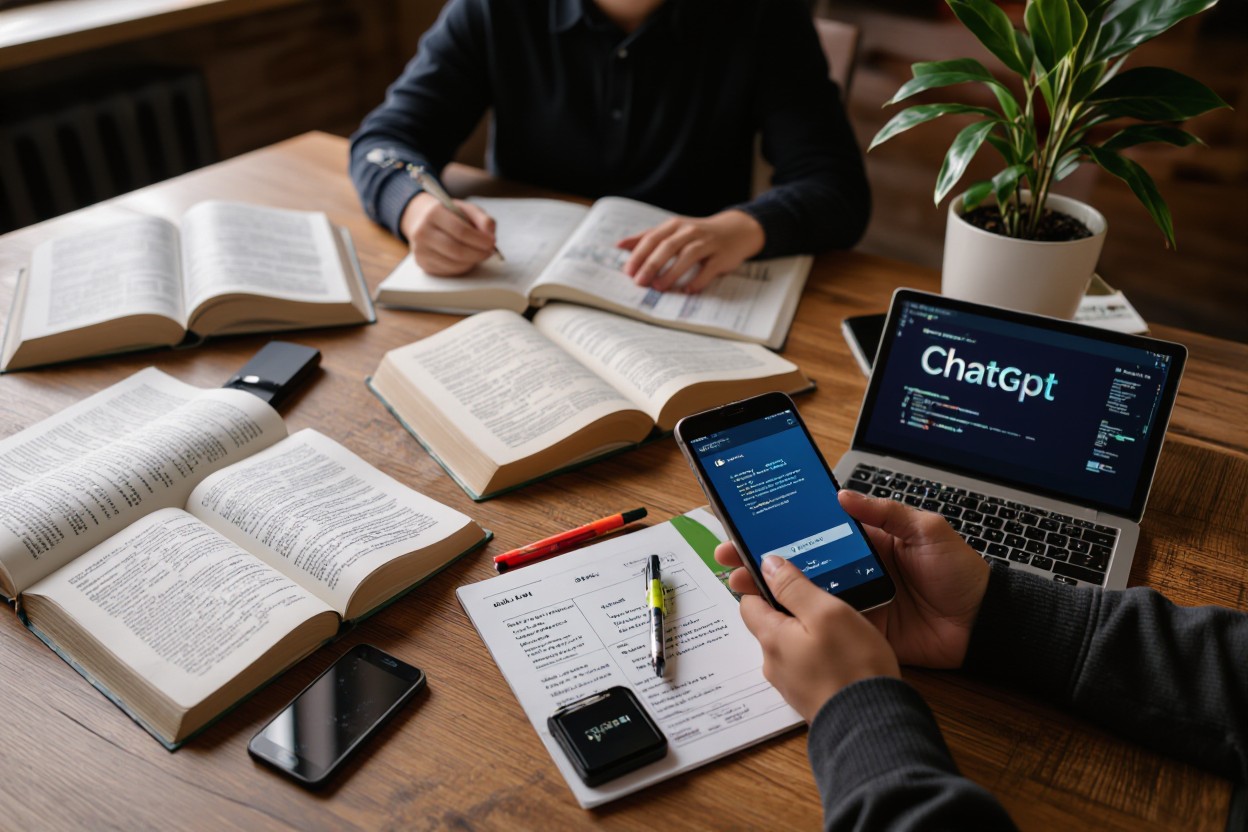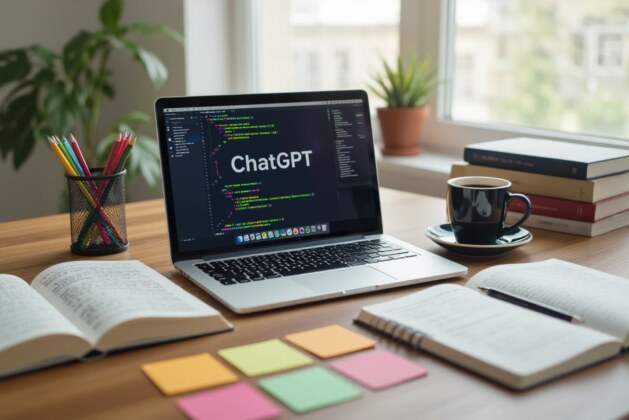There’s no denying that effective study habits make a big difference in learning outcomes. When I discovered ChatGPT, I realized how it could become my powerful study assistant. You can use it to generate summaries, clarify difficult concepts, and even quiz yourself on key topics. However, it’s important to avoid over-reliance to maintain your critical thinking skills. By integrating ChatGPT wisely into your routine, you unlock new ways to enhance retention and stay motivated in your studies.

Transforming Study Time into Smart Time
By leveraging ChatGPT, I transformed countless inefficient study sessions into highly productive ones. Instead of passively reading or cramming, I started using ChatGPT to sharpen focus and enhance understanding. The AI helps turn vague study goals into specific, manageable tasks—making every minute feel purposeful. For example, when preparing for exams, ChatGPT generates targeted questions and summaries that maximize retention, turning hours of unfocused reading into sessions of active learning.
Crafting Personalized Study Plans with ChatGPT
ChatGPT tailors study plans to fit your unique goals, strengths, and schedule. I input my upcoming exam dates, subjects, and time constraints, and ChatGPT outputs a daily breakdown balancing review, practice, and rest. This adaptiveness is a game-changer compared to generic plans, since it adjusts based on your progress or unexpected events, ensuring you consistently move forward without burnout.
Utilizing AI for Goal Setting and Progress Tracking
Setting clear, measurable goals becomes easier with ChatGPT guiding you to define realistic milestones. I use the AI to set weekly learning targets with specific outcomes, then regularly check progress by prompting it to quiz me or analyze my study logs. This ongoing assessment keeps motivation high and gaps visible, so you can fine-tune your approach continuously.
Expanding on progress tracking, ChatGPT’s ability to analyze responses and identify weak points offers a personalized dashboard for self-monitoring. It doesn’t just mark answers right or wrong; it provides insights into patterns, such as frequent mistakes or time spent per topic. In one case, after identifying consistent errors in organic chemistry, I adjusted my plan to dedicate more time to reaction mechanisms, dramatically improving my exam scores. Using AI not only encourages accountability but also refines your study habits in real time, turning data into actionable steps.
Enhancing Comprehension Through Interactive Learning
Using ChatGPT interactively transforms passive reading into an engaging dialogue that sharpens understanding. I find that breaking complex topics into smaller chunks and discussing them with ChatGPT forces me to articulate concepts clearly, which solidifies my grasp. You can test your knowledge by explaining ideas aloud to ChatGPT and immediately receiving feedback or alternative perspectives. This conversational approach deepens comprehension far beyond rereading notes, especially in challenging subjects like organic chemistry or advanced literature, where pinpointing subtle details can make all the difference.
Engaging in Real-Time Q&A Sessions
Jumping into real-time Q&A sessions with ChatGPT lets you clarify doubts instantly without waiting for a tutor or digging through textbooks. For example, when I struggled with calculus problems, asking step-by-step solutions helped me identify exactly where I got stuck. This immediate back-and-forth mimics having a study partner who’s available 24/7, so you won’t lose momentum. By customizing questions ranging from basic definitions to complex applications, ChatGPT adapts to your current level and keeps the challenge appropriate, reinforcing your learning continuously.
Leveraging Summarization and Elaboration Features
ChatGPT’s ability to summarize dense material into concise, digestible paragraphs helps me extract key points quickly, saving hours of manual note-taking. I also use it to elaborate on brief notes, expanding them with examples or real-world applications that make abstract ideas tangible. This dual function of condensing and expanding information supports different phases of studying—from initial review to deep exploration—making complex topics far more approachable.
Digging deeper, I’ve found that ChatGPT can tailor summaries for specific goals, such as creating flashcards or crafting essay outlines. When preparing for exams, I often input lecture transcripts or textbook chapters and receive clear, structured recaps highlighting vital formulas, dates, or theories. Furthermore, asking for elaborations triggers explanatory responses filled with analogies or historical context, which not only enrich understanding but also aid long-term retention by connecting facts to memorable stories.
Tapping into the Power of Subject-Specific Resources
Diving deeper into your field of study often means accessing resources tailored to the unique language and concepts of that subject. By focusing on materials and references specific to what you’re learning, you can save time sifting through generic content. ChatGPT can guide you toward academic papers, textbook chapters, or curated websites focused on your discipline, enhancing the relevance of your study sessions. This method helps you build a solid foundation while also revealing nuanced details that broader resources might miss.
Discovering Tailored Study Materials and References
When you’re searching for targeted study aids, I find that prompting ChatGPT with precise terms related to your syllabus or course content uncovers specialized resources such as scholarly articles, lecture notes, or problem sets. For example, feeding it keywords like “organic chemistry reaction mechanisms PDF” or “calculus integration practice problems” yields highly focused recommendations. This accelerates your access to quality content that aligns perfectly with your academic goals, making each study session more productive and less overwhelming.
Using ChatGPT for Concept Clarification and Deep Dives
ChatGPT excels at breaking down complex ideas into digestible explanations and can guide you through multi-layered concepts step by step. Whether you’re struggling with quantum physics principles or the intricacies of literary theory, you can ask for concise definitions, analogies, or even detailed walkthroughs of specific problems. This interactive dialogue helps me grasp difficult topics faster, especially when textbooks feel too dense or abstract.
To deepen understanding beyond surface-level definitions, I use ChatGPT to explore examples and real-world applications of challenging concepts. For instance, after a brief explanation of photosynthesis, I might request a detailed walk-through of the Calvin cycle with chemical equations and molecular interactions. ChatGPT also assists in tackling complex math proofs by breaking them into logical steps, offering intermediate calculations and checking assumptions along the way. This iterative clarification process makes abstract information more tangible and cements my knowledge firmly.

Building Effective Study Techniques with AI Guidance
Leveraging ChatGPT to tailor your study techniques allows you to optimize your learning based on personal preferences and weaknesses. By asking specific questions, you can uncover strategies that align perfectly with your goals, whether it’s mastering complex concepts or managing time efficiently. For example, ChatGPT can help you create balanced study schedules or suggest active recall methods, ensuring your study sessions are both productive and engaging. Using AI to refine your techniques turns vague study habits into targeted actions that yield measurable improvement.
Exploring Various Learning Styles and Their Applications
ChatGPT helps you identify whether you absorb information better through visual aids, auditory content, or hands-on practice by analyzing your feedback and preferences. By incorporating methods aligned with your learning style—such as mnemonic devices for auditory learners or mind maps for visual learners—you enhance retention and comprehension. Tailoring study materials accordingly makes your sessions more efficient and enjoyable, boosting your ability to recall information exactly when you need it.
Developing Practice Quizzes and Study Games
You can use ChatGPT to generate customized quizzes on nearly any subject, turning passive review into interactive challenges that strengthen memory. By incorporating varied question types—multiple choice, true/false, or fill-in-the-blank—your practice becomes dynamic, catering to different cognitive skills. Turning facts into games or timed quizzes also introduces a competitive element, motivating consistent engagement and deeper learning.
Delving deeper, developing tailored practice quizzes with ChatGPT enables you to focus on weak points by generating questions that specifically target these areas. For example, if Latin verb conjugations challenge you, the AI can create repetitive drills emphasizing those forms. Plus, integrating these quizzes with gamified elements like point scoring or time limits transforms mundane review into engaging challenges. This approach not only reinforces knowledge but also tracks progress, offering immediate feedback that guides your next study session adjustments for optimal growth.

Overcoming Study Barriers with Intelligent Support
Using ChatGPT, you can tackle common stumbling blocks like procrastination, distraction, and inefficient time management. This intelligent assistant provides personalized strategies that adapt to your unique patterns, helping you maintain momentum and stay organized. By integrating AI support into your study routine, you unlock new ways to overcome barriers that often derail focus or sap motivation.
Addressing Procrastination and Focus Issues
ChatGPT helps pinpoint reasons behind procrastination by engaging in thoughtful dialogue about your study environment and habits. It suggests tailored techniques such as the Pomodoro method or goal segmentation, breaking overwhelming tasks into manageable chunks. When you struggle with focus, I rely on ChatGPT to coach me through mindfulness exercises or to recommend minimizing specific distractions, effectively boosting sustained attention during study sessions.
Implementing Study Breaks and Scheduling Tools
Integrating scheduled breaks into your study plan prevents burnout and improves retention, and ChatGPT excels at crafting customized break schedules based on your workload and productivity rhythms. I use it to design flexible timetables that blend intensive work intervals with restorative pauses, enhancing both efficiency and well-being.
Expanding on this, ChatGPT can analyze your peak focus periods using your inputs and recommend not just when, but how long your breaks should be for maximum benefit. For instance, alternating 25-minute study sprints with 5-minute breaks aligns with evidence-based strategies that enhance concentration. Moreover, it helps you set reminders and adjust plans dynamically if unexpected tasks arise, turning your study schedule into a living, adaptive tool rather than a rigid checklist.
Summing up
So, I have found that using ChatGPT to enhance your study habits can be a powerful strategy. By asking ChatGPT to clarify concepts, generate practice questions, or organize study schedules, you can tailor your learning experience to suit your needs. You can engage actively with the material and develop a better understanding, which makes studying more effective and efficient. I encourage you to experiment with different approaches and use this tool as a consistent study companion to reach your academic goals.





Leave a comment